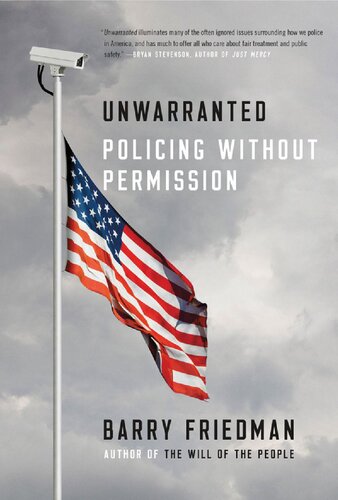
Unwarranted
Policing Without Permission
کتاب های مرتبط
- اطلاعات
- نقد و بررسی
- دیدگاه کاربران
نقد و بررسی

October 31, 2016
Friedman (The Will of the People), an NYU professor and founder of the Policing Project, instructively examines what he identifies as the crisis in 21st-century U.S. policing. Drawing on landmark court cases, extensive history, and incisive analysis, Friedman takes a hard look at current problems and proposes astute and well-researched solutions in favor of more “democratic and constitutional” policing. He examines contentious law enforcement practices, including stop-and-frisk, and government surveillance in an era of hyperconnectivity and terrorism. Citing ample evidence of government overreaching, he makes a strong case for more police transparency and accountability and for more “public input and debate” into designing policies and laws that protect civilians’ rights. He takes an in-depth look at law enforcement violations of the Fourth Amendment, which guarantees protection against unreasonable searches and seizures, and includes a history of the search warrant and accounts of how police and courts have enabled invasive searches. He argues that the courts have problematically been assigned the role of restoring justice but not the power to check outdated laws, legislators who pander to political whims, and law enforcement agencies that go largely unchecked. This book is the definitive guide to contemporary policing and its necessary reforms. Agent: Don Lamm, Fletcher & Company.

Starred review from December 1, 2016
A law professor diagnoses the ills of American policing and prescribes a healthy dose of sunlight."Policing in the United States--from the overzealous beat cop all the way to the NSA--is out of control," writes Friedman (Law/New York Univ. School of Law; The Will of the People: How Public Opinion Has Influenced the Supreme Court and Shaped the Meaning of the Constitution, 2009, etc.), and the fault lies not with the police but with us. Unlike most other governmental functions, policing largely proceeds without democratically endorsed rules provided in advance; legislatures and courts have shown neither the inclination nor the capacity to provide this guidance. Police have therefore been left to define their own, possibly unwritten, policies, which have often been kept secret. Too often, the result is a trampling of individual rights that would never have been publicly approved and a waste of resources on ineffective procedures. Among other proposals, Friedman advocates that courts impose more rigorous demands for warrants supported by probable cause for searches and surveillance and refuse to support policing techniques or uses of new technologies that have not been explicitly authorized by local or state authority. The author presents an incisive analysis of the pitfalls that have frustrated previous attempts to regulate policing and shows how attempts by the courts to do the job have resulted instead in an erosion of constitutional protections and individuals' rights to privacy. He also considers the special problems of oversight presented by the recent transition of policing from reactive pursuit of wrongdoers to regulatory mass surveillance intended to deter crime. Friedman's lively writing and clarity of expression enable him to make the thicket of applicable Fourth Amendment law readily understandable for general readers, helpfully illuminated by the personal stories behind the case law. At once creative and conservative, Friedman offers a timely blueprint for recovering democratic control of local and national law enforcement.
COPYRIGHT(2016) Kirkus Reviews, ALL RIGHTS RESERVED.

January 1, 2017
Friedman (Jacob D. Fuchsberg Professor of Law & founding director, Policing Project, New York Univ. Sch. of Law; The Will of the People) brings to light issues in the current policing environment. Relying on recent cases, he argues that the state of U.S. policing is far from democratic and constitutional, instead frequently encouraging mass surveillance and spying through the use of closed-circuit TV, location tracking, and predicative tactics, as well as excessive force, including stop-and-frisk and SWAT searches. Friedman is hopeful that through the public's engagement with police officials, and through public policy on the use of force, racial bias, and the adoption of new technologies, that a more just form of policing is possible. The book also provides historical analytics of the search warrant and outlines the ways in which police and courts have been permitted to conduct invasive searches. Includes extensive case index notes. VERDICT Friedman is successful in presenting compelling arguments for policing reform, incorporating current issues such as the Michael Brown shooting, the case of Anthony Graber, and Black Lives Matter as support. Most suitable for law or criminology students. [See Prepub Alert, 8/8/16.]--Nathalie Reid, Univ. of California, Los Angeles
Copyright 2017 Library Journal, LLC Used with permission.

January 1, 2017
In the aftermath of 9/11, law-enforcement facilities across the country have become increasingly militarized, raising alarms among civil-rights activists that domestic-policing tactics may have gone too far. According to New York University law professor Friedman in this probing and sometimes chilling analysis of our modern-day American legal system, those concerns are entirely justified. An authority on constitutional law, Friedman takes aim at our faltering courts and cites numerous examples where our Fourth Amendment right against unreasonable search and seizure has been violated, from cases of racial profiling where innocent suspects have felt humiliated to the Los Angeles County sheriff department's illegal 2014 aerial surveillance of Compton, California. The good news, Friedman argues, is that we, as citizens, have more power to change the system than we give ourselves credit for, citing many examples of successful civilian court victories and the work of recently founded activist groups. A powerful manifesto against unbalanced policing methodologies and an illuminating and sobering critique of political and legal forces in the U.S.(Reprinted with permission of Booklist, copyright 2017, American Library Association.)

























دیدگاه کاربران